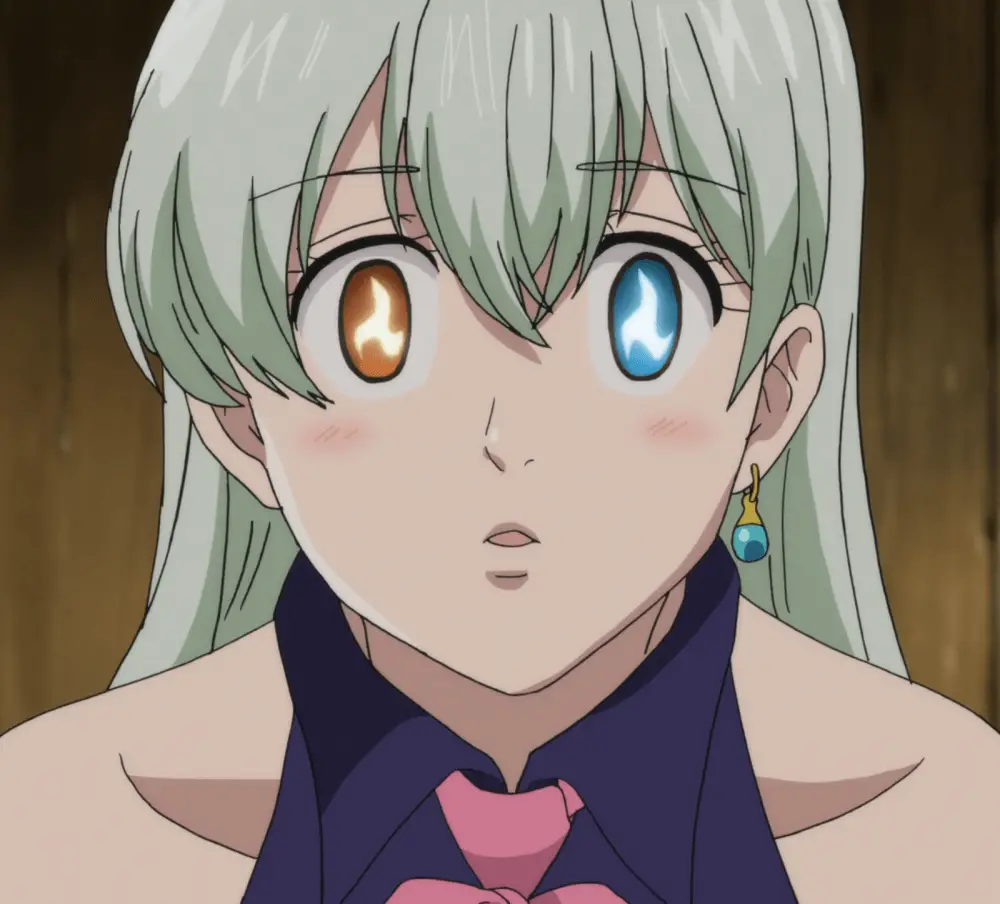Seven Deadly Sins: Elizabeth (ISFJ)

Si:
“When I was young, I used to be scolded by my father for pulling pranks.”
Elizabeth is constantly referencing the past. Many of these references are unnecessary, but prompted somehow by something going on around her. A good example can be seen when Meliodas compliments her on her earrings, she explains her history with them. Another example is when she explains her history with Veronica to Griamore. Shortly thereafter, she also explains where to bury Veronica and the personal history behind that location. Similarly, she informs Hendrickson of how disappointed she is in him, and begins to explain the way he was in the past. The frequency of these moments through the show suggest that Elizabeth is an Si user.
In addition, while Elizabeth is bold enough to strike out on her own and do what needs to be done, she’s prone to caution, and as a result, worrying. She tends to be easily frazzled, which is especially shown in the tavern. Like many high Si users, Elizabeth desires deeply to be physically useful, and works toward that end to become an integral member of their team. She also does little things like serve people food when hungry, or stays behind with Diane when Diane is unable to go into town with the rest of the team.
Fe:
“Sorry. When I saw your tears, they just started flowing.”
“Well, I… I really can’t be certain since I’ve never felt this way about anyone before.”
Although we did consider Fi, Elizabeth appears to be an Fe user. As many healthy feelers, she’s polite and friendly. She wants to protect the kingdom and help others. However, her focus appears to be primarily on others, and she seems to find social decorum to be very important, which supports Fe use. An example can be seen when she says to Ban “Please forgive me for not rising to greet you.” Elizabeth also doesn’t tend to stand up for herself. She’s clearly bothered by Meliodas’ actions, but never speaks up against him, falling prey to the Fe doormat stereotype. He never seems to push her over the edge or trigger her. Another example is when Gowther calls out her feelings for Meliodas, and she just finds a way to excuse herself from the room. Elizabeth does deal out Fe judgements in certain situations. An example is shown when she explains how he has let down her father, the kingdom, and everyone who trusted him. Notice how the main focus here is on his effect on other people, rather than general morality or wrongdoing.
Elizabeth deals with her emotions like an Fe user. When she sees Melodias crying in the cave, she begins crying herself without even knowing why or what’s going on. She then apologizes when Meliodas points it out. In addition, she seems to need to discuss her emotions with others in order to understand them. She’s unsure of her feelings toward Meliodas, which she expresses to Diane. By the end of the conversation, she realizes that she’s in love with him. This is contrary to the more introspective nature of Fi, since she’s relying on someone else to help her interpret her feelings.
Ti:
“It makes sense, but I’d like to continue serving our people.”
“What kind of reason could it be? That Sir King wants to get into the Necropolis now?”
Tertiary Ti can be hard to describe, since Ti doesn’t tend to manifest as much externally in the lower Ti users. As a whole, tertiary Ti users tend to not appear very assertive, which is true of Elizabeth. She also tends to frame her responses in terms of what makes sense, and she tries to understand the reasoning behind people’s actions. For example, this is how she approaches their first encounter with King. She also frames her response to King in this manner, when he offers to let her and some others take refuge in the Fairy King’s Forest. Rather than saying that she can’t do that, or it’d be cowardly or wrong, Elizabeth responds by saying that it makes sense, but she’d rather continue to serve.
Lastly, her need to logically rationalize her emotions to understand them points to Ti use. A prime example of this can be seen in the previously mentioned conversation with Diane, when she has to discuss them in order to understand them. This is Ti introspection, rather than Fi introspection.
Ne:
Elizabeth tends to see possibilities or potential theories, but quickly dismisses them, which shows her distrust for her inferior function. While she is shown periodically speculating, specifically for strategic reasons, there are a couple of situations where her inferior intuition really surfaces. The first is when she has a dream which comes partially true. She notices this, but dismisses the observation as ‘overthinking’. Second, at a certain point in the show, she begins to pick up on the fact that she is a reincarnation. She confronts Meliodas about this, but then once again, gives up on the theory quickly when he dismisses her. This all demonstrates her devaluing her inferior function, which is a common approach to one’s inferior function.
Hi there, reader! If you enjoyed that article, leave us a quick comment to encourage us to keep writing. In addition, if you've found our content helpful in some way, please consider Buying Us A Coffee to support our efforts and help keep this website running. Thank you!
